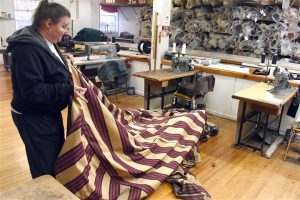Large enough to serve, yet small enough to care
Rothman Awning weathers time, and a few changes, over 95 years
By Laura Legere / Pittsburgh Post-Gazette
Ninth in a series
Bobby Dudley was out for a life of adventure and ended up in the awning business.
A young man in the 1950s on his way from his childhood home in North Carolina to claim free land as a homesteader in Alaska, the Dudley family patriarch stopped for temporary work in Pittsburgh. He took a job hanging awnings for Ruben Rothman, who had established Rothman Awning Co. in 1921.
He liked the work and stayed.
Mr. Dudley’s children now run the 95-year-old company that makes, sells and stores custom canvas awnings for a service area that stretches roughly 60 miles around its headquarters on West Elizabeth Street in Hazelwood.
Steadiness and longevity are principal virtues in a business where the product can last for 30 years. On its website, Rothman Awning boasts that it has had the same phone number since 1930.
Sandy Johns, Rothman Awning’s president and a daughter of Mr. Dudley, who remains the CEO at age 83, says she still keeps the original rotary phones to use when the power goes out.
To stay in business this long, she said, “You have to have good customer care.”
The awning industry in the region includes a handful of companies that can trace their history back 50 years or more. Even at 95, Rothman Awning is not unique among its competitors for its long tenure.
One McKees Rocks company, A. Mamaux & Son, was founded in Pittsburgh in 1865 by a French immigrant sail maker who saw an opportunity during the Civil War to adapt his expertise to making canvas wagon covers and tents.
Rothman Awning has survived through economic downturns, a series of successions and a merger.
Ruben Rothman’s son Benjamin took over the business from his father. Mr. Dudley continued to work for the Rothmans even as he started his own awning business in the basement of his home. In 1973, the two companies merged.
The families were close — Ms. Johns, 52, said Benjamin Rothman was like a grandfather. When she and her four siblings were born, Ruben Rothman would jestingly give Mr. Dudley five yards of canvas so his wife could sew the child an outfit made of awning material.
The company is still a family business. Ms. Johns said half of the 13 employees are family members and several other employees have been there for decades.
She attributes the company’s resilience, in part, to the fact that the employees know the business so thoroughly: The company’s salesmen are also its installers. Ms. Johns is the company president but she also cuts the fabric and, with her daughter and her sister, does the sewing.
The work is seasonal, with a rush of installations in the spring and early summer and another for removal and storage in the fall and winter. Between sales and storage, the company does $550,000 in annual business, Ms. Johns said. About 90 percent of its clients are residential and 10 percent commercial.
This winter, she expects to have 1,400 storage customers after Rothman picked up about 200 customers because another awning company is going out of business.
The company has innovated in small ways. It established a niche in the 1950s selling and setting up canvas sukkahs, the outdoor booths used for meals and dwelling during the seven-day Jewish festival of Sukkot. In the 1990s, Rothman Awning was a local pioneer in customized awning designs to fit angled decks.
But most of the innovation has been mild. Ms. Johns said she computerized a payroll system that used to be done by hand. The company sells, but tends to warn customers away from, retractable awnings, which appear to offer great flexibility, but can’t stand up in a sudden storm.
“My dad ran it the same was as Mr. Rothman did,” she said. “I keep running it the same way he did.”
The biggest shock to the business probably came in the 1960s when the now ubiquitous, more durable Sunbrella awning fabric was introduced to replace traditional cotton material that wore out within five years.
The new canvas was guaranteed to last 10 years and Mr. Rothman and Mr. Dudley thought it would force them out of business.
“They were questioning, ‘How are we going to survive if the awnings don’t get replaced every five years?’” Ms. Johns said. “But we managed.”
The company wins its customers’ loyalty by helping them prolong the life of their awnings. The annual storage fee covers minor repairs and patching that other companies charge extra for, she said. And Rothman does not condemn an awning at the end of its expected life if some love and new thread will give it extra years.
“When the other awning company is telling them that their awnings are no longer good, and I tell them, ‘You’ve got another five or six years of life out of these’ — I’ll doctor them up, I’ll sew the seams — who do you think they’re going to come to for their next set when it does go bad?” she said. “They’re going to come to me.”
She said most new customers find Rothman Awning through the telephone book, or through word of mouth or by seeing an ad on Angie’s List, the online business review directory.
Often, new customers are children of parents who were customers.
That is the case with Barbara Jaffe, 63, who lives in the Squirrel Hill home where she grew up. The house has sported Rothman awnings for as long as she can remember.
Three other families on the street also have Rothman awnings, she said. Over the years her awnings have been replaced and repaired, always by Rothman.
“I’m happy with their service,” she said.
Ms. Johns said 100 customers have done business with the company since the 1960s. Every five years, she gives them a free year of storage, to thank them for their loyalty.
Laura Legere: llegere@post-gazette.com.








